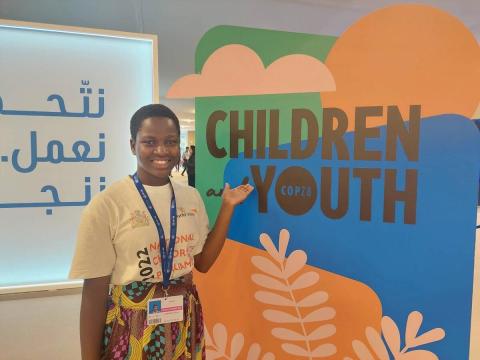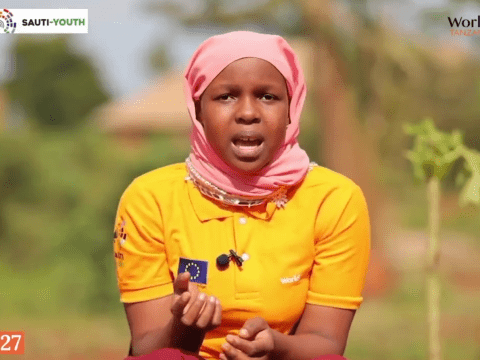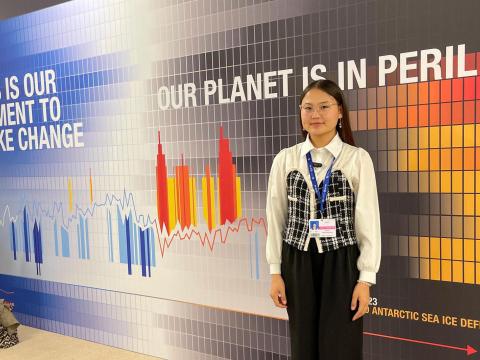
Youth and Children speak up for Environment and Climate Action
Sarah Onduko-Obiri and Hausner Wendo tell us how World Vision’s social accountability approaches have allowed youth to influence climate action at individual, community and systems level; and highlight the participation of World Vision’s five child delegates at the recent COP28 conference.
From local-level advocacy in Tanzania to the global stage at COP28, World Vision is lifting up the voices of children and youth to call for climate justice.
Climate justice for children and young people
Children bear the brunt of food and water insecurity, conflict and diseases: climate change and related environmental degradation has accelerated extreme poverty, inequality and vulnerability among children, their households and communities. Climate hazards like droughts and floods continue to intensify globally, land degradation and desertification are accelerating, and the hunger crisis is at its worst. Children and young people around the world have expressed their desire to fully participate in the debate on the climate change crisis and support in the development of solutions.
In August 2023, the UN Committee on the Rights of the Child issued General Comment No. 26, which calls for governments to protect children in the face of the deepening climate crisis. This marked the first time the Committee has affirmed children’s right to live in a clean, healthy and sustainable environment. The Comment emphasises children’s views and participation in environmental decision-making, and stresses the critical role of environmental education.
World Vision works to improve child well-being across the world through environmental restoration and climate action, including through landscape-based approaches like the Amazon Basin and the Central American Dry Corridor initiatives. Our interventions actively involve children at the front and centre: from local-level community advocacy, to the international stage of COP28.
Citizen Voice and Action (CVA) empowers youth to speak up for climate action at local level
World Vision’s Citizen Voice and Action (CVA) project model has been used by local communities in over 50 countries to advocate effectively with governments, on a wide range of issues from healthcare to gender equity. Environmental action is no exception: CVA empowers communities to participate in decision-making and hold governments to account to keep their promises on climate issues. World Vision firmly believes that children and young people can and should be contributing and leading these efforts.
Our latest Citizen Voice and Action (CVA) foundational guide highlights the power of social accountability approaches within environmental management and climate action projects in Ireland, Kenya, Tanzania and Haiti. In Tanzania and Ireland, the EU-funded SAUTI programme empowered youth to be strong voices in their communities and to monitor government commitments on climate action. The project used innovative and creative means, including art, social media and a Citizen Voice and Action (CVA) SAUTI mobile app.
A recent evaluation of the SAUTI project found that climate action was a highly effective entry point for engaging youth in local governance. The Citizen Voice and Action (CVA) approach generated immediate impact at systems, community, and individual levels: it secured an infusion of financial resources and human capital, empowered communities, and equipped youth with improved knowledge about climate action and with the skills to advocate for change.
Children’s voices at COP 28
“Through their stories, children and youth can amplify their voices and contributions on climate change.” Nomin (age 17), COP28 youth advocate from Mongolia.
World Vision brought children’s voices to a global platform in December at COP28, the annual global UN Climate Conference. Five children and youth joined the World Vision delegation: Taissa (13) from Amazonas (Brazil), Hella (22) from Iraq, Selestina (16) from Malawi, Edward (13) from Tanzania, and Nomin (17) from Mongolia.
Their calls to action were simple:
- include children in the climate action decision making-processes, to guarantee children’s right to a clean, healthy and sustainable environment;
- address hunger and malnutrition;
- promote nature-based agricultural solutions such as Regreening Communities and Farmer Managed Natural Regeneration that restore arable land;
- and increase climate financing, especially climate change adaptation.
Taíssa is a 13-year-old climate champion from an indigenous Amazon community, where she is part of a school-based Citizen Voice and Action (CVA) group. At COP28 Taissa spoke powerfully at various events about the links between hunger and climate change.
Selestina (16) from Malawi participated in the youth ‘pre-COP’ conference (COY18), and joined a panel at an official COP28 side event. She left with renewed resolve to speak up and mobilise her community: “I have learnt…children’s voices matter in advocating for change. It is therefore going to be my top priority in creating awareness in primary schools and my community at large to ensure that we put a stop to activities that destroy nature.”
Meanwhile, Edward (13) from Tanzania had the chance to speak with the deputy prime minister of Ireland. Edward said, “I have come to realize that safeguarding our environment isn't just a responsibility for specific age groups or nations; it's a collective effort uniting people of all ages and backgrounds for the betterment of our planet.”
The takeaway
Evidence shows that youth and children should be active change makers and not just passive recipients of adult-led processes. As they are the most vulnerable to the effects of a changing environment, their witness and their future must be at the heart of planning and decision-making through action and advocacy.
Approaches such as Citizen Voice and Action (CVA) and opportunities to be at the centre of the COP discussions and other international fora are instrumental in realizing this, in line with the guidance and spirit of General Comment No. 26 by the UN Committee on the Rights of the Child.
Sarah Onduko-Obiri, holds the role of global Governance and Social Accountability Advisor with WVI. With more than 14 years’ experience in governance and public policy, Sarah provides technical advice to World Vision’s governance and social accountability programmes, focusing on innovation and adaptations, DMEAL, Knowledge management and building evidence for impact.
Hausner Wendo is the Environmental Sustainability and Climate Action (ESCA) Advisor with WVI. With more than 13 years of work and research experience on environmental sustainability, climate and disaster resilience, and carbon-based programming across East Africa, he provides technical and strategic guidance for World Vision’s ESCA programming and policy implementation.

